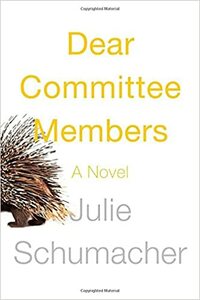Take a photo of a barcode or cover
emotional
funny
lighthearted
fast-paced
Plot or Character Driven:
A mix
Strong character development:
Yes
Loveable characters:
Yes
Diverse cast of characters:
No
funny
lighthearted
fast-paced
Plot or Character Driven:
Character
Strong character development:
Complicated
Loveable characters:
Complicated
Diverse cast of characters:
No
Flaws of characters a main focus:
Yes
i chose this to try and read more epistolary works and this one seemed fun; i enjoyed it more then i thought i would
A painful, funny, painfully funny epistolary novel about the dark secrets of academia and human failings. I cringed...and I laughed. Well worth it.
dark
funny
fast-paced
Plot or Character Driven:
Character
Strong character development:
Complicated
Loveable characters:
Complicated
Diverse cast of characters:
No
Flaws of characters a main focus:
Yes
funny
fast-paced
Plot or Character Driven:
Character
Strong character development:
No
Loveable characters:
No
Diverse cast of characters:
No
Flaws of characters a main focus:
Yes
I enjoyed this humorous epistolary that poked fun of collegiate English departments. It was quite the Rollercoaster experience and much like an amusement park ride, it left me reminiscent for the experience and also slightly disappointed.
These would be perfect for a high-school speech and debate oratory competition. I can see a young sophomore, a black book in her hand turning the page as she became this obnoxious professor.
It's a fast fun read.
These would be perfect for a high-school speech and debate oratory competition. I can see a young sophomore, a black book in her hand turning the page as she became this obnoxious professor.
It's a fast fun read.
I love reading books that are written in an epistolary style like this one; and, as a professor of the humanities, I was really excited to read this book. However, when I first started reading this book, I didn't like the main character at all and I nearly stopped reading. I found him to be pompous and I found some of his letters to be a bit ridiculous. I've known too many professors like him, and I can't stand them either. However, by about the 10th letter, I started to realize that this book is a larger social commentary on higher education, and his letters have a certain freedom that many academics wished we had.
The main character is still a pompous ass, but he's tired of keeping quiet about what we go through as professors in the University system, especially professors of the humanities and liberal arts. The complaints in here are real. The irritation with committee work, fellow professors' quirks, with other departments having larger budgets (in our case the College of Business) while we are forced to make due. The poverty that graduate students endure, and the problems we face while trying to secure funding. Schumacher has laid it all out perfectly in this book, and I feel motivated to voice my feelings more openly in department meetings and I will be approaching my own LORs differently in the future. Also, I have had so many similar experiences with students who come to you last minute for a letter of recommendation. So many.
I took off a star because some of the letters are a bit far fetched. I get that the author is trying to provide backstory through this style, but I find it hard to believe that a professor would include personal information like this in LORs. I thought it detracted from the story a bit in some instances and I found also that I wanted to know more information than was given in others. The book is a bit short, and I feel like some of the characters are underdeveloped. That said, I'm not sure how to go about fixing that, which is why writing like this is a complicated thing to pull off. I think Schumacher did a beautiful job, but there is still some awkwardness throughout.
The main character is still a pompous ass, but he's tired of keeping quiet about what we go through as professors in the University system, especially professors of the humanities and liberal arts. The complaints in here are real. The irritation with committee work, fellow professors' quirks, with other departments having larger budgets (in our case the College of Business) while we are forced to make due. The poverty that graduate students endure, and the problems we face while trying to secure funding. Schumacher has laid it all out perfectly in this book, and I feel motivated to voice my feelings more openly in department meetings and I will be approaching my own LORs differently in the future. Also, I have had so many similar experiences with students who come to you last minute for a letter of recommendation. So many.
I took off a star because some of the letters are a bit far fetched. I get that the author is trying to provide backstory through this style, but I find it hard to believe that a professor would include personal information like this in LORs. I thought it detracted from the story a bit in some instances and I found also that I wanted to know more information than was given in others. The book is a bit short, and I feel like some of the characters are underdeveloped. That said, I'm not sure how to go about fixing that, which is why writing like this is a complicated thing to pull off. I think Schumacher did a beautiful job, but there is still some awkwardness throughout.
A one-sided epistolary novel (is there a word for that?) presenting the mind of an English professor at a small midwest liberal-arts college as he writes letters of recommendation (LORs) for current and past students, internal letters to his department chair and other department heads, and letters to publishing houses. There is unbridled snark, making this an enjoyable if not always cheerful story of a year in academia.
Oh, this book was painful yet mesmerizing to read. The book is a collection of letters written by a creative writing professor at a small university (Payne). He writes letters of recommendation for students, faculty, administrators and writers (published or not).
Because I worked for English departments for over 20 years, the absurdities of higher education, of the field of humanities, and the world of creative writing were all too familiar (such as the campus fracas over the use of a colon in a university document). I found the most absurd passages to ring the most true.
As we read a series of letters penned by Dr. Jason T. Fitger, we learn entirely too much about his self-serving trajectory from a young writer to a jaded tenured professor. Through background stories, digressions, queries to colleagues for favors and forgiveness. and footnotes (you MUST read the footnotes), we also learn about his haphazard love life and his many on-campus feuds. Nevertheless, I hold some affection for Jay. His deft use of language (albeit very self-serving) is admirable.
If offered the opportunity to socialize with the dean, the provost, the internship director, an economics professor or Jay, I would choose to dine with Jay. Now Schumacher needs to write one of Jay's fictitious novels. (I choose Stain, but Schumacher needs to reinsert the love scene conducted on manuscript pages.)
Because I worked for English departments for over 20 years, the absurdities of higher education, of the field of humanities, and the world of creative writing were all too familiar (such as the campus fracas over the use of a colon in a university document). I found the most absurd passages to ring the most true.
As we read a series of letters penned by Dr. Jason T. Fitger, we learn entirely too much about his self-serving trajectory from a young writer to a jaded tenured professor. Through background stories, digressions, queries to colleagues for favors and forgiveness. and footnotes (you MUST read the footnotes), we also learn about his haphazard love life and his many on-campus feuds. Nevertheless, I hold some affection for Jay. His deft use of language (albeit very self-serving) is admirable.
If offered the opportunity to socialize with the dean, the provost, the internship director, an economics professor or Jay, I would choose to dine with Jay. Now Schumacher needs to write one of Jay's fictitious novels. (I choose Stain, but Schumacher needs to reinsert the love scene conducted on manuscript pages.)
I enjoyed this and the epistolary format was fun, but I wish the main character had been...nicer, I suppose. This doesn't reach the heights of Jane Smiley's Moo or Kingsley Amis' Lucky Jim, but it's a pretty decent satire of today's university.




